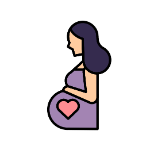
Pregnancy Loss
5 Common Causes You Should Know About Pregnancy Loss And Miscarriage
6 min read | Updated on 29-05-2022 by HappyPreggie
Miscarriage is a devastating experience with long-term emotional effects for many couples and families. It happens when the developing fetus or embryo dies in the womb due to natural causes or exposure to certain substances that are not suitable for a pregnant mother.

In many cases, a miscarriage normally happens during the first 20 weeks of pregnancy and can be categorized into two different categories. An early miscarriage is known to occur in the first trimester between 1 to 12 weeks of pregnancy. On the other hand, a late miscarriage typically happens during the second trimester and between 13 to 20 weeks. There are many reasons for this to happen and knowing what the causes are is very important for couples who are expecting.
#1 Abnormal Chromosomes
More than half of the time, a miscarriage that happens in the first 12 weeks is normally caused by an issue with the baby's chromosomes. A healthy person would normally possess 46 chromosomes in total. These are the cells that contain the genes to determine a baby's distinctive characteristics, such as hair and eye colour. A fetus or a baby can never develop properly with the wrong number of chromosomes or with defective ones.
 (Image credits to GenengNews)
(Image credits to GenengNews)
An abnormality in an unborn baby’s chromosomes will cause several problems:
Besides these three, there are also a few more abnormalities that can affect a pregnancy. These include trisomy which causes Down syndrome and monosomy which triggers Turner's syndrome.

As a carrier of the womb, the mother’s health plays an important role in the development of the baby. Bad medical conditions of the mother will leave a huge impact on the fetus that she is carrying. These conditions include:

Other than health, the mother’s habits can also affect the risk of pregnancy loss or miscarriage. Mothers-to-be should always be cautious and conscious with everything that they do every day. It is important to avoid doing practices that are dangerous for pregnancy such as:

It is normal for pregnant women to take medicine based on a doctor’s advice for certain health concerns. However, there are also particular medications that they should avoid at all costs. According to WebMD medical experts, these prescriptions that are known to raise the chances of miscarriage and pregnancy loss are:

In addition to medicine intake, another area that pregnant women should take care of is their diet practice. Eating a sufficient amount of healthy meals every day is really important as it provides enough nutrition for their body. Nevertheless, it is crucial to be cautious of what is inside the meal to avoid food poisoning during pregnancy as it can increase the risk of miscarriage. These illnesses include:
Some food poisoning illnesses like listeriosis and toxoplasmosis can also infect the unborn baby even if the mother did not get any symptoms.
In many cases, miscarriage usually cannot be avoided especially when the cause is due to scientific nature such as chromosome abnormalities. It can take a few weeks to more than a year for a woman’s body to recover from the pregnancy loss and it can take even longer for them to recover emotionally from the feelings of grief and distress. While the baby may only have stayed inside their wombs, the bond that has been formed over the earlier weeks will surely leave a huge impact. Hence, getting continuous support from family and close friends are very important during this healing time.
Want to read more? Check out these easy exercises for pregnant mothers to stay fit and also everything about travelling on air during your pregnancy.
(Image credits to HoustonPublicMedia)
In many cases, a miscarriage normally happens during the first 20 weeks of pregnancy and can be categorized into two different categories. An early miscarriage is known to occur in the first trimester between 1 to 12 weeks of pregnancy. On the other hand, a late miscarriage typically happens during the second trimester and between 13 to 20 weeks. There are many reasons for this to happen and knowing what the causes are is very important for couples who are expecting.
What are the common causes?
#1 Abnormal Chromosomes
More than half of the time, a miscarriage that happens in the first 12 weeks is normally caused by an issue with the baby's chromosomes. A healthy person would normally possess 46 chromosomes in total. These are the cells that contain the genes to determine a baby's distinctive characteristics, such as hair and eye colour. A fetus or a baby can never develop properly with the wrong number of chromosomes or with defective ones.
An abnormality in an unborn baby’s chromosomes will cause several problems:
- Blighted Ovum: No embryo develops.
- Molar pregnancy: Both sets of chromosomes come from the father but none comes from the mother. The placenta cannot grow normally and the fetus will not be able to develop.
- Partial molar pregnancy: The father gives two sets of chromosomes in addition to the set from the mother. The embryo may start to develop but will stop at a certain point.
Besides these three, there are also a few more abnormalities that can affect a pregnancy. These include trisomy which causes Down syndrome and monosomy which triggers Turner's syndrome.
#2 Health Problems
(Image credits to VerywellFamily)
As a carrier of the womb, the mother’s health plays an important role in the development of the baby. Bad medical conditions of the mother will leave a huge impact on the fetus that she is carrying. These conditions include:
- Infections like rubella.
- Poorly controlled long-term diseases such as diabetes or high blood pressure.
- Issues with the uterus or cervix like a fibroid.
- STD infections such as chlamydia or HIV.
#3 Lifestyle
(Image credits to Twin-Cities)
Other than health, the mother’s habits can also affect the risk of pregnancy loss or miscarriage. Mothers-to-be should always be cautious and conscious with everything that they do every day. It is important to avoid doing practices that are dangerous for pregnancy such as:
- Smoking
- Heavy drinking
- Consuming illegal drugs
- Extreme activities
- Difficult exercises
#4 Medication Intake
(Image credits to NST)
It is normal for pregnant women to take medicine based on a doctor’s advice for certain health concerns. However, there are also particular medications that they should avoid at all costs. According to WebMD medical experts, these prescriptions that are known to raise the chances of miscarriage and pregnancy loss are:
- Misoprostol: Used for conditions such as peptic ulcers and rheumatoid arthritis
- Methotrexate: Used to treat rheumatoid arthritis.
- Retinoids: Used for skin conditions such as eczema and acne.
- Non-steroidal anti-inflammatory drugs (NSAIDs): Used for pain and inflammation.
#5 Food Poisoning
(Image credits to Freepik)
In addition to medicine intake, another area that pregnant women should take care of is their diet practice. Eating a sufficient amount of healthy meals every day is really important as it provides enough nutrition for their body. Nevertheless, it is crucial to be cautious of what is inside the meal to avoid food poisoning during pregnancy as it can increase the risk of miscarriage. These illnesses include:
- Listeriosis: Caused from consuming raw milk products like blue cheese and raw or undercooked seafood.
- Salmonellosis: Caused from eating raw or undercooked eggs.
- Toxoplasmosis: Caused by eating infected raw meat.
Some food poisoning illnesses like listeriosis and toxoplasmosis can also infect the unborn baby even if the mother did not get any symptoms.
In many cases, miscarriage usually cannot be avoided especially when the cause is due to scientific nature such as chromosome abnormalities. It can take a few weeks to more than a year for a woman’s body to recover from the pregnancy loss and it can take even longer for them to recover emotionally from the feelings of grief and distress. While the baby may only have stayed inside their wombs, the bond that has been formed over the earlier weeks will surely leave a huge impact. Hence, getting continuous support from family and close friends are very important during this healing time.
Want to read more? Check out these easy exercises for pregnant mothers to stay fit and also everything about travelling on air during your pregnancy.
Join the largest support network for family health and well-being. Ready to get started?
Get started
















